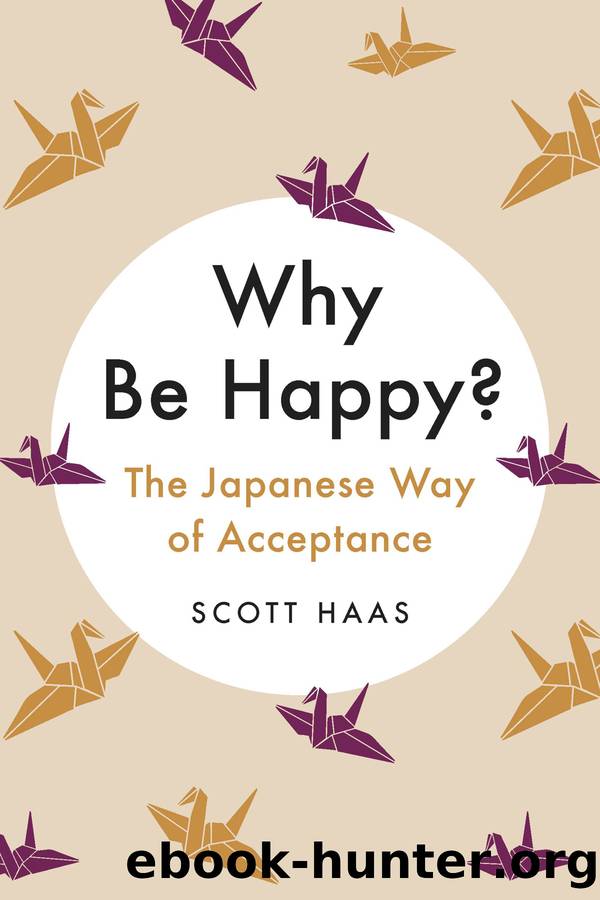Why Be Happy? by Scott Haas

Author:Scott Haas [HAAS, SCOTT]
Language: eng
Format: epub
Publisher: Hachette Books
Published: 2020-07-07T00:00:00+00:00
Footnotes
1 The word for “wine” in Japanese is… wine.
Silence
It’s as if the entire nation of Japan has been read the Miranda warning: “You have the right to remain silent. Anything you say can be used against you in court.…”
Silence in Japan is part of the national character, and so essential to the culture that its uses and misuses define in large measure the ways in which people relate to one another both intimately and at work.
Silence as a cultural value in Japan goes back centuries. Check out the writing of Kenkō, whom I mentioned before: “Can you imagine a well-bred man talking with the authority of a know-it-all, even about a matter with which he is in fact familiar? The boor who pops up on the scene from somewhere in the hinterland answers questions with an air of utter authority in every field.… It is impressive when a man is always slow to speak, even on subjects he knows thoroughly, and does not speak at all unless questioned.”
And yet, while silence, circumspection, nonverbal communication through posture and facial expression, and so on have benefits, there are drawbacks.
What if you say the wrong thing? What is the wrong thing? How do you know? What if you misread the mood? By misunderstanding the other person, you’ve been really disrespectful. Not only have you offended them, you’ve shown yourself to be so self-centered that you failed to recognize what others are thinking. You may not belong in this group. You should be ashamed of yourself.
Better to say nothing!
As a foreigner, an adult male from the West, I don’t catch this vibe when I talk or do something that is alien to the culture. Oh, sure, if I were a rude person, or demanding, or the sort of individual who thinks his home is in the Greatest Country in the World, well, then, yeah, there would be problems.
But I’m not that guy.
My m.o. is to try to be like everyone else in a new place: to move like the people around me, to adopt their phrases, even to take on the tempo of their speech. I’m really passive in Japan; I try to let things happen and surrender to the situation, to whoever’s in charge.
And, as I’ve said, my friends there have taught me a lot and continue to do so, starting many years ago.
This set of adaptive behaviors is observed by Japanese, of course, who often then find my efforts wildly amusing. The criticism they foist upon one another for not conforming to groups is not generally applied to me. As an outsider who behaves himself, or at least tries, sometimes clownishly, I get to observe and participate, and ironically because I’m not regarded as one of them, not being part of the group, I’m not expected to behave consistently like others in the group. (I have to be taught, tolerated, or ignored.)
At least, it’s rare for anyone there to say something mean to me. I obey the rules: no talking on the
Download
This site does not store any files on its server. We only index and link to content provided by other sites. Please contact the content providers to delete copyright contents if any and email us, we'll remove relevant links or contents immediately.
| Anthropology | Archaeology |
| Philosophy | Politics & Government |
| Social Sciences | Sociology |
| Women's Studies |
A. A. Milne by Winnie the Pooh Winnie-the-Pooh 02(1314)
The Book of Five Rings by Miyamoto Musashi(1292)
The Bhagavad Gita by Eknath Easwaran(1165)
The Art of War by Sun Tzu(1015)
Bruce Lee Jeet Kune Do by Bruce Lee(929)
The complete book of five rings by Miyamoto Musashi(882)
The Upanishads by Eknath Easwaran(772)
Siddhartha (Penguin Classics Deluxe Edition) by Hermann Hesse(766)
The Bhagavad-Gita by Barbara Stoler Miller(744)
The Four Chinese Classics by David Hinton(738)
Bushido Explained by Alexander Bennett(723)
Roots of Yoga by James Mallinson(709)
Ninja Fighting Techniques by Stephen K. Hayes(705)
Leo Strauss and the Rediscovery of Maimonides by Kenneth Hart Green(686)
The Yoga Sutras of Patanjali by Patanjali(669)
The Hundred Tales of Wisdom by Idries Shah(668)
Chinese Gung Fu by Bruce Lee(655)
THE ART OF WAR (Giles Translation) by Sun Tzu(644)
Tantra by Feuerstein Georg(643)
